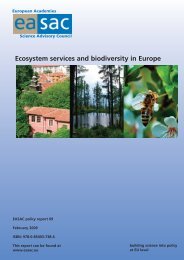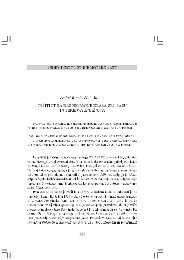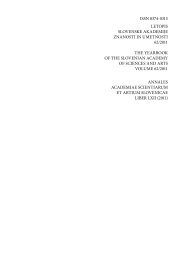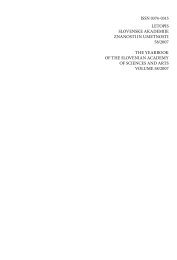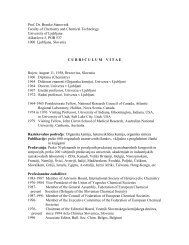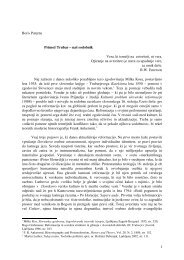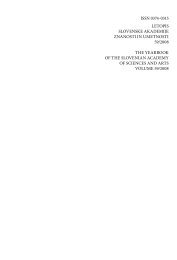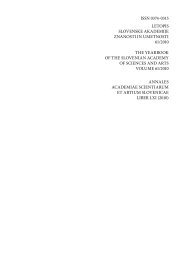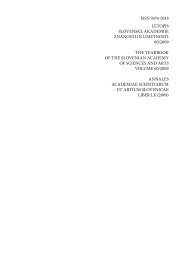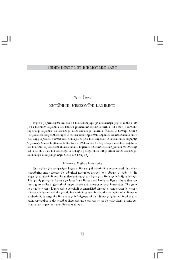Taking Inquiry-Based Science Education into Secondary ... - SAZU
Taking Inquiry-Based Science Education into Secondary ... - SAZU
Taking Inquiry-Based Science Education into Secondary ... - SAZU
You also want an ePaper? Increase the reach of your titles
YUMPU automatically turns print PDFs into web optimized ePapers that Google loves.
10<br />
<strong>Taking</strong> IBSE <strong>into</strong> <strong>Secondary</strong> <strong>Education</strong><br />
identifying these key explanatory frameworks, the curriculum should also include ideas about the nature of<br />
scientific activity and knowledge. There are various statements of such ideas. One example 20 , provided to<br />
conference participants, proposes that the curriculum should enable students to understand that:<br />
• All material in the Universe is made of very small particles<br />
• Objects can affect other objects at a distance<br />
• Changing the movement of an object requires a net force to be acting on it<br />
• The total amount of energy in the Universe is always the same but energy can be transformed when<br />
things change or are made to happen<br />
• The composition of the Earth and its atmosphere and the processes occurring within them regulate the<br />
Earth’s climate<br />
• The solar system is a very small part of one of millions of galaxies in the Universe<br />
• Organisms are organised on a cellular basis<br />
• Organisms require a supply of energy and materials for which they are often dependent on other<br />
organisms<br />
• Genetic information is passed down from one generation of organisms to another<br />
• Evolution is responsible for the diversity of all organisms, living and extinct.<br />
In addition, there are ideas about the nature of scientific knowledge, how it is created and how it is used,<br />
that also form part of the key ideas that students need to understand, for instance, that:<br />
• <strong>Science</strong> assumes that for every effect there is a cause, or multiple causes.<br />
• Scientific explanations, theories and models are those that best fit the facts known at a particular time<br />
• The knowledge produced by science is used in technologies to create products to serve human ends<br />
• Applications of science often have ethical, social, economic and political implications.<br />
Of course these ideas cannot be taught as such. They need to be developed progressively from smaller<br />
ideas derived from specific activities. Problems of over-prescription arise when they are specified in terms<br />
of a plethora of facts and terms to be learned. Then there is danger of links to the overall ideas being lost,<br />
leaving a fragmented curriculum which is well described by Alberts as ‘an inch deep and a mile wide’ 21 . The<br />
links can more easily be retained and reinforced by expressing the curriculum in terms of interconnected<br />
ideas, as suggested by Millar and Osborne 22 and represented in the Big Ideas report cited above. A curriculum<br />
set out in such terms would allow teachers freedom to help students develop their understanding<br />
through studying topics and problems of relevance to students.<br />
5.1.2 Transfer from primary to secondary school<br />
The aim is for the big ideas to develop progressively as students move through their school lives in primary<br />
and secondary school. Through a process of inquiry and sharing with others, the ideas that students have<br />
about the world around should progress from the ‘small’ ideas – about particular events and objects – to<br />
become ‘bigger’ ones which explain a range of phenomena. At various points in the course of schooling,<br />
however, there are moves for students from class to class and school to school which can interrupt this<br />
progress. The move from primary to secondary school frequently means a discontinuity in ways of learning<br />
which can negatively affect performance and attitude in relation to science 23 .<br />
20 Harlen, W. (Ed) 2010<br />
21 Alberts, B. 2009<br />
22 Millar, R. and Osborne, J Eds 1998<br />
23 Royal Society 2010<br />
Report on the conference, York, UK, October 27-29 2010



